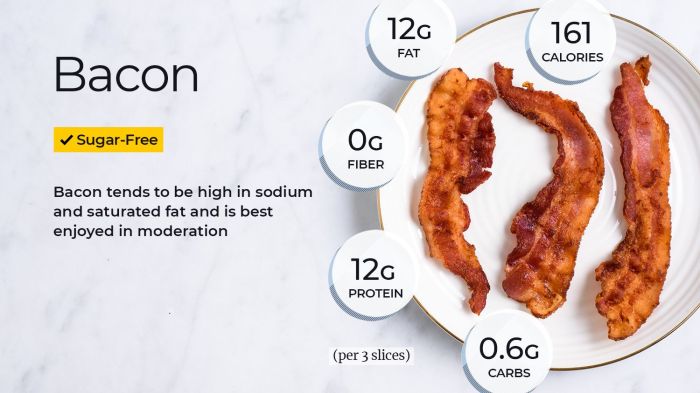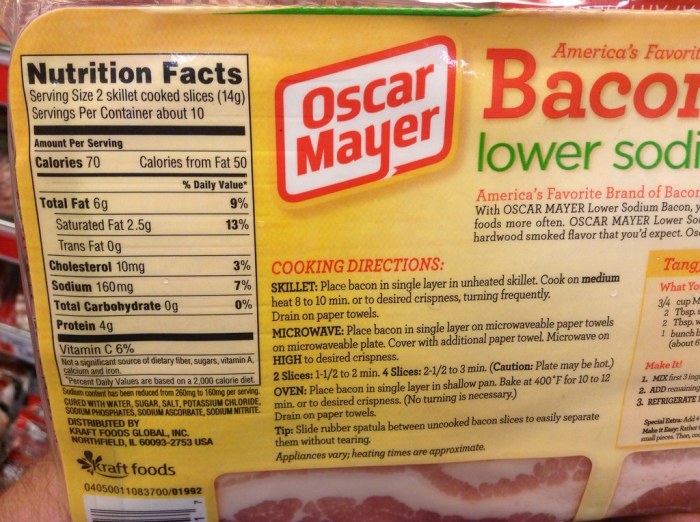Burger King Bacon King Overview

Bacon king nutrition facts – The Bacon King is a popular Burger King menu item known for its generous layering of bacon and its satisfyingly rich flavor profile. It represents a classic example of a fast-food indulgence, appealing to consumers seeking a hearty and flavorful burger experience. Understanding its components and history provides context to its continued popularity.The Bacon King burger’s key ingredients typically include a flame-broiled beef patty, several strips of crispy bacon, melted cheddar cheese, mayonnaise, ketchup, and lettuce on a toasted sesame seed bun.
The preparation involves grilling the beef patty to order, crisping the bacon, and assembling the burger with the other ingredients. The precise number of bacon strips can vary slightly depending on location and preparation, but the overall abundance of bacon is a defining characteristic.
Typical Serving Size
A standard Bacon King burger is considered a single serving. While precise weight can fluctuate, it generally falls within the range of a typical quarter-pounder burger, augmented by the substantial addition of bacon and other ingredients. This size is designed to be a complete and satisfying meal for a single person, though some consumers might choose to share or supplement it with additional sides.
Bacon King History and Popularity
The exact date of the Bacon King’s introduction is not readily available in publicly accessible archives. However, its popularity is clearly established through its continued presence on Burger King menus worldwide. The burger’s success is largely attributable to its simple yet effective combination of familiar flavors—the savory beef patty, the salty crunch of bacon, and the creamy richness of the cheese and mayonnaise—appealing to a broad range of palates.
The Bacon King’s sustained presence on the menu demonstrates its consistent appeal to consumers and its successful positioning within Burger King’s overall product strategy. Its popularity likely stems from a successful balance of satisfying taste, familiar ingredients, and a price point that makes it an accessible treat.
Nutritional Information Breakdown
Understanding the nutritional content of the foods we consume is crucial for maintaining a balanced diet and overall well-being. This section provides a detailed breakdown of the nutritional information for a single Burger King Bacon King burger, allowing for informed choices about your food intake. We will examine the key nutrients and compare its profile to other popular fast-food options.
Bacon King Nutritional Content
The following table presents the approximate nutritional content of one Burger King Bacon King burger. It’s important to note that slight variations may occur depending on location and preparation methods. These values are based on average data from Burger King’s official website and other reputable sources.
| Nutrient | Amount | % Daily Value (DV)* |
|---|---|---|
| Calories | 810 | 41% |
| Total Fat | 49g | 60% |
| Saturated Fat | 20g | 100% |
| Cholesterol | 115mg | 38% |
| Sodium | 1530mg | 64% |
| Total Carbohydrate | 46g | 15% |
| Dietary Fiber | 2g | 8% |
| Total Sugars | 10g | – |
| Protein | 36g | – |
Percent Daily Values are based on a 2,000 calorie diet. Your daily values may be higher or lower depending on your calorie needs.
Comparison with Other Fast-Food Burgers
The Bacon King’s nutritional profile, particularly its high calorie, fat, and sodium content, is typical of many fast-food burgers. Direct comparisons vary based on the specific burger and its ingredients, but generally, burgers from chains like McDonald’s, Wendy’s, and Jack in the Box will show similar trends in high calorie and fat content. For example, a Big Mac from McDonald’s has a similar calorie count, though the specific breakdown of fats and other nutrients might differ slightly.
A Wendy’s Baconator often boasts a higher calorie and fat count. These comparisons highlight the importance of mindful consumption and portion control when choosing fast food. Choosing leaner options or opting for smaller sizes can significantly reduce the overall nutritional impact.
Ingredient Analysis
Understanding the nutritional profile of the Bacon King requires a detailed examination of its individual components. Each ingredient contributes significantly to the overall caloric content, macronutrient breakdown, and potential health implications. Analyzing these contributions helps in making informed choices about consumption frequency.
Nutritional Contributions of Main Ingredients
The Bacon King’s nutritional profile is a complex interplay of its core ingredients: the beef patty, bacon, cheese, bun, and sauce. The beef patty provides protein and saturated fat, contributing significantly to the overall calorie count. Bacon adds further saturated fat and sodium, along with a substantial amount of protein. The cheese, typically a processed variety, increases the fat and sodium content, while also contributing some calcium and protein.
Want to know more about the nutritional breakdown of a Bacon King? It’s important to consider the complete nutritional picture of your meal. For a healthier contrast, you might also want to check out the nutritional information for roma tomatoes nutrition facts , a great source of vitamins and antioxidants. Understanding both the Bacon King’s and the tomatoes’ nutritional profiles helps you make informed choices about your diet.
The bun provides carbohydrates, primarily in the form of refined grains, and adds to the overall calorie count. Finally, the sauce, often a mayonnaise-based mixture, contributes additional fat, sodium, and calories. The specific nutritional values for each ingredient vary depending on the exact formulation and supplier. For precise figures, one should consult the Burger King nutritional information panel.
Potential Health Impacts of High Consumption
Regular consumption of foods high in saturated fat, sodium, and refined carbohydrates, such as the Bacon King, can contribute to various health concerns. High saturated fat intake is linked to increased cholesterol levels and the risk of cardiovascular disease. Excessive sodium consumption can raise blood pressure, increasing the risk of hypertension and related complications. A diet rich in refined carbohydrates can lead to blood sugar fluctuations and contribute to weight gain and the development of type 2 diabetes.
While occasional indulgence may not pose significant risks, frequent consumption of such a calorie-dense and nutritionally unbalanced meal should be approached with caution. For example, a person with pre-existing heart conditions might experience negative health consequences more readily than a healthy individual.
Potential Allergens in the Bacon King
The Bacon King contains several common allergens. The beef patty is a potential allergen for individuals with beef allergies. Bacon, derived from pork, poses a risk for those with pork allergies. The cheese used may contain milk proteins, triggering reactions in individuals with dairy allergies. The bun typically contains wheat, posing a risk for those with wheat allergies or celiac disease.
Finally, the sauce may contain various ingredients that could cause allergic reactions depending on the specific recipe; common potential allergens include soy, eggs, and various nuts. Consumers with allergies should carefully review the Burger King allergen information and consult with their physician or allergist before consuming the Bacon King or any other product.
Dietary Considerations
The Bacon King, with its high calorie and fat content, presents a challenge for individuals following various dietary plans. Understanding its nutritional profile is crucial for making informed choices and adapting it to fit specific dietary needs or health conditions. Let’s examine how the Bacon King fits into different dietary approaches and explore ways to modify it for healthier consumption.The Bacon King’s high saturated fat and sodium content make it unsuitable for many dietary plans aiming for weight management or improved cardiovascular health.
However, with mindful modifications, some aspects can be adapted.
The Bacon King and Various Dietary Plans
The Bacon King is not easily incorporated into most restrictive diets. Its high fat and calorie count directly conflicts with the principles of low-calorie, low-fat, or weight-loss diets. For low-carb diets, the bun is the primary concern, and substituting it with a lettuce wrap or removing it entirely would significantly reduce the carbohydrate intake. High-protein diets might find the burger’s protein content beneficial, but the accompanying fats and carbs need to be considered.
Vegetarian and vegan diets, of course, exclude the Bacon King entirely, as it contains meat and dairy products. Plant-based alternatives exist, however, which could offer similar taste profiles but with a much healthier nutritional profile. For instance, a plant-based patty with vegan bacon and a whole-wheat bun would provide a much more balanced meal.
Potential Substitutions and Modifications
Making healthier choices often involves mindful substitutions and portion control. Here are some modifications that could make the Bacon King a slightly healthier option:
- Swap the bun: Replace the regular bun with a whole-wheat bun or even a lettuce wrap to reduce refined carbohydrates and increase fiber intake. This change significantly impacts the overall calorie and carbohydrate content.
- Reduce the bacon: Bacon is a major source of saturated fat. Reducing the amount of bacon or opting for a leaner cut can decrease the overall fat content. Consider turkey bacon as a healthier substitute.
- Add vegetables: Including extra vegetables like lettuce, tomato, and onion adds volume and nutrients without significantly increasing calories. This improves the nutritional balance of the meal.
- Choose a smaller portion size: Opting for a smaller burger or sharing a regular-sized one can significantly reduce calorie and fat intake.
- Reduce or eliminate cheese: Cheese contributes to the high saturated fat and calorie count. Removing or reducing the amount of cheese can be a simple yet effective modification.
Impact on Health Conditions
The Bacon King’s high saturated fat, sodium, and calorie content poses potential risks for individuals with certain health conditions.High saturated fat intake is linked to increased cholesterol levels, increasing the risk of heart disease. The high sodium content can contribute to high blood pressure, further exacerbating cardiovascular risk. Individuals with diabetes should be particularly cautious due to the high carbohydrate content and its potential impact on blood sugar levels.
The significant calorie density also poses a risk for weight gain, a contributing factor to various health problems. A single Bacon King meal can easily exceed the recommended daily intake of saturated fat and sodium for many individuals. Careful consideration and portion control are vital for those managing these conditions. Consult a doctor or registered dietitian for personalized dietary advice.
Visual Representation of Nutritional Data
Understanding the nutritional content of the Bacon King burger is best achieved through visual aids. These representations can quickly communicate the proportions of macronutrients and highlight key nutritional aspects, making informed dietary choices easier. We will explore two distinct visual approaches: a bar graph focusing on macronutrient breakdown and an infographic summarizing key nutritional information and health considerations.
Macronutrient Breakdown Bar Graph
This bar graph would visually represent the proportions of protein, carbohydrates, and fat in a single serving of the Bacon King. The horizontal axis would list the three macronutrients: Protein, Carbohydrates, and Fat. The vertical axis would represent the grams of each macronutrient. Each macronutrient would be represented by a colored bar, with the length of the bar corresponding to its gram weight.
For example, if the Bacon King contains 40g of fat, 20g of protein, and 30g of carbohydrates, the fat bar would be the longest, followed by the carbohydrate bar, and then the protein bar. Clear labels would be included for each bar, indicating the macronutrient and its corresponding gram weight. A title, such as “Macronutrient Composition of Burger King’s Bacon King,” would be displayed at the top.
A legend would explain the color coding used for each macronutrient. This visual would allow for a quick comparison of the relative amounts of each macronutrient.
Key Nutritional Information and Health Considerations Infographic, Bacon king nutrition facts
The infographic would be designed to summarize key nutritional information and health considerations related to consuming the Bacon King. It could be organized into sections, each representing a different aspect of the nutritional profile. One section could display the total calories, followed by a breakdown of calories from fat, carbohydrates, and protein. Another section could highlight the amounts of key nutrients like sodium, saturated fat, and cholesterol.
A visual representation, perhaps using icons, could depict the percentage of daily recommended values for these nutrients. For example, a small icon of a salt shaker could be accompanied by the sodium content and its percentage of the recommended daily intake. A section could address health considerations, such as potential implications for individuals with high cholesterol or those following a low-sodium diet.
This section might use cautionary symbols or color-coding to highlight areas of potential concern. The infographic would utilize a clear and concise layout, using visual elements like icons and color-coding to enhance understanding and readability. The overall design would aim for clarity and ease of interpretation, allowing for a quick assessment of the nutritional profile and its potential health implications.
Comparison to Similar Products

Understanding the nutritional profile of the Bacon King within the context of other popular fast-food burgers provides valuable perspective for informed dietary choices. This comparison allows us to analyze the relative impact of different ingredients and preparation methods on overall nutritional content. We will examine the nutritional differences between the Bacon King, the Big Mac, and the Whopper, highlighting key areas of contrast and similarity.Nutritional differences between these burgers stem primarily from variations in ingredients, portion sizes, and cooking methods.
These variations directly influence the calorie count, fat content, and levels of sodium and other nutrients. The following table presents a comparative analysis. Please note that nutritional information can vary slightly depending on location and preparation.
Nutritional Comparison of Popular Burgers
| Burger | Calories | Total Fat (g) | Sodium (mg) | Saturated Fat (g) |
|---|---|---|---|---|
| Bacon King (Burger King) | 840 | 52 | 1270 | 22 |
| Big Mac (McDonald’s) | 590 | 30 | 1000 | 12 |
| Whopper (Burger King) | 660 | 40 | 980 | 16 |
Ingredient Analysis and Nutritional Impact
The significant differences in calorie and fat content between these burgers are largely attributable to variations in ingredients and portion sizes. The Bacon King, for example, contains significantly more bacon than the Big Mac or Whopper, contributing to its higher fat and calorie count. The increased amount of bacon also increases the saturated fat content, a type of fat linked to potential health risks when consumed in excess.
The Whopper, while having less bacon than the Bacon King, still contains a considerable amount of fat due to its beef patty and other ingredients. The Big Mac, comparatively, has a lower fat content due to its smaller size and the relative leanness of its patties, although it still contains a substantial amount of sodium. The use of different sauces and bread types also contributes to the differences in overall nutritional profiles.
For instance, the Bacon King’s sauce may contain more fat and calories compared to the sauces used in the Big Mac or Whopper.
Expert Answers: Bacon King Nutrition Facts
Is the Bacon King gluten-free?
No, the bun contains gluten.
Are there vegetarian/vegan alternatives to the Bacon King?
Burger King does not offer a direct vegetarian/vegan equivalent to the Bacon King. However, customers can explore other menu options that fit their dietary restrictions.
How much sodium is in a Bacon King?
The sodium content varies slightly depending on location and preparation, but it’s generally high. Check the nutritional information panel at your local Burger King for the most accurate data.
Can I order a Bacon King without cheese?
Yes, you can typically request modifications like removing cheese. However, this may not significantly impact the overall calorie and fat content.


